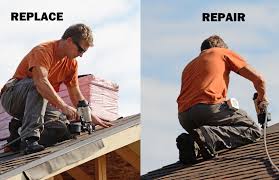
The roof is an essential component of any residential building, and it not only protects against the elements but also adds to the aesthetic appeal of the property. However, like any other part of a home, a roof can deteriorate over time, requiring either repair or replacement. In this article, we will discuss the differences between repairing and replacing a roof.
Repairing a Roof: Roof repair is often the best option when the damage is minimal and localized. Some of the common reasons for roof repairs include:
- Leaks: If you notice a leak in your roof, it may be due to damaged or missing shingles or flashing. Repairing the affected area can prevent further water damage and prolong the life of your roof.
- Hail or Wind Damage: Hail or wind can cause damage to the shingles, resulting in cracks or missing pieces. Repairs can fix the damaged area and prevent leaks.
- Minor Wear and Tear: Regular wear and tear, including cracked or curled shingles, can be repaired to extend the life of your roof.
Replacing a Roof: Roof replacement is necessary when the damage is widespread, and the roof has reached the end of its lifespan. Some of the common reasons for roof replacement include:
- Age: A roof has a lifespan, and most residential roofs last between 15 to 25 years. If your roof is approaching the end of its lifespan, it may be time to consider a replacement.
- Multiple Leaks: If your roof has multiple leaks, it may be a sign that it’s time to replace the entire roof.
- Extensive Damage: If your roof has sustained extensive damage, such as from a storm, and repair is not feasible, replacement may be necessary.
- Aesthetics: If you are looking to improve the curb appeal of your home, replacing the roof can add value and improve the overall look of your property.
Factors to Consider: When deciding between repairing and replacing your roof, there are several factors to consider, including:
- Cost: Repairing a roof is generally less expensive than replacing it. However, if you need frequent repairs, the cost can add up over time, and it may be more cost-effective to replace the roof.
- Age: If your roof is nearing the end of its lifespan, it may be more practical to replace it rather than continuing to repair it.
- Energy Efficiency: Newer roofs are generally more energy-efficient than older roofs. If you are looking to save on your energy bills, replacing your roof may be the best option.
- Aesthetics: If you want to improve the overall look of your home, replacing your roof can add value and improve the curb appeal.
In conclusion, repairing or replacing a roof depends on the extent of the damage, the age of the roof, and the overall cost. It’s important to consult with a roofing professional to determine the best course of action for your specific situation. A professional can assess the damage and provide recommendations on the most cost-effective and efficient way to maintain your roof.


